
 The Collected Poems of BERTOLT
The Collected Poems of BERTOLT
BRECHT  TRANSLATED AND EDITED BY TOM KUHN AND DAVID CONSTANTINE WITH THE ASSISTANCE OF CHARLOTTE RYLAND
TRANSLATED AND EDITED BY TOM KUHN AND DAVID CONSTANTINE WITH THE ASSISTANCE OF CHARLOTTE RYLAND  LIVERIGHT PUBLISHING CORPORATION A Division of W. W. Norton & Company Independent Publishers Since 1923 New York | London Adjusting type size may change line breaks. Landscape mode may help to preserve line breaks.
LIVERIGHT PUBLISHING CORPORATION A Division of W. W. Norton & Company Independent Publishers Since 1923 New York | London Adjusting type size may change line breaks. Landscape mode may help to preserve line breaks.
CONTENTS
T . S.
Eliot, writing on Tennyson, found in him three qualities which are seldom found together except in the greatest poets: abundance, variety, and complete competence. Brecht is a great poet, one of the three or four best in the whole of German literature (a literature not short of first-rate poetry). He is abundant: the Berlin-Frankfurt edition of his complete works contains more than two thousand poems. He is various, on many topics, from shifting points of view, in all the registers and in many tones of voice. He is widely eclectic, a thieving magpie out of much of world literature, he took from Greece and Rome, China, Japan, Britain, France, America, his own compatriots, the living and the long-dead, across frontiers of space and time. His technical virtuosity in traditional forms and in forms he invented or developed for his own needs, is breathtaking.
He works effectively in hexameters, in tight rhyming quatrains, sonnets, ballads, unrhyming verse in irregular meters, and in numerous other shapes and forms as the poetic occasion demands. And for any just assessment of his total poetic oeuvre we should have to consider his dramas too: the tense, sometimes violent verse of Saint Joan of the Stockyards , The Caucasian Chalk Circle , and (out of Hlderlins idiosyncratic translation) Antigone ; the poignant lyricism of passages in The Good Person of Szechwan , the parodistic Shakespearean blank verse of Arturo Ui ; the songs in many plays; and more, much more, besides. Brecht was a thorough poet. Throughout his writing life he thought constantly about the idea and the practice of poetry, about forms, about their nature, possibilities, best uses; and he adapted his thinking and his practice continually to answer the violently disrupting demands of the times and the places he lived in. This constant reflection on poetry, and the lifelong making of poetry, produced in Brecht a rare coherence of important things to say and of apt ways of saying them. In the English-speaking world, where he is still best known as a dramatist and theoretician on drama, the problem of course is translation.
Hence the significance of this ambitious and much more comprehensive attempt to come to terms in English with his vast and varied output in the lyric genre. But Brecht was himself skeptical about translating poems. He thought that the greatest fault was to try to translate too much. He once wrote that one should aim only to translate the thoughts and the attitude of the poetalthough then in practice he seems to have preferred translations that stuck as close as possible to the original in every imaginable respect. The trouble is that, for the poet, rhythm and rhyme and indeed every other constituent part are also, precisely, part of the attitude of a poem. And Brecht was notoriously picky about translators.
For English translations of his poems he kept trying to engage W. H. Auden, Christopher Isherwood, or Archibald MacLeishall with remarkably little success. So it was to lesser voices that the task first fell, and not with promising results. When various poems came out in American literary journals in 1946, Brecht was shocked by the quality of the translations and reckoned the whole chapter a catastrophe. R. R.
Hays, Hoffman Hays, a prolific but little-known American writer, translator, and anthropologist who got to know Brecht during his American exile, who went on to publish a first slim selection of Brechts poems in English (in parallel text) in 1947. Shockingly, there were only two further slight collections of Brechts poems in English between Hayss book and John Willetts collection of 1976, nearly thirty years later, with translations by many hands of over four hundred poems. The initial reception of that later volume was enthusiastic, as of a revelation for poets and readers in the English-speaking world. George Steiner opined that it disclosed Brecht as that very rare phenomenon, a great poet, for whom poetry is an almost everyday visitation and drawing of breath. There were glowing reviews all round. But as time went on the poet Brecht began to sink again.
Admittedly, the reception in the German-speaking world had and has been slow as well. Partly because of Brechts own reticence. Steiner was right, there was scarcely a week of Brechts adult life, from his teenage years on, in which he was not, alongside everything else, also writing poems. But, although he published great collections during his own lifetime, there were also many poems, finished and accomplished, which he set aside, or seemed happy to reserve for private use. Less than half of his output of poems was published by the time of his death in 1956, and many poems first saw the light of dayas our endnotes revealin the 1980s or even 1990s. Earlier editors and translators were bashful, both with regard to the poems about sex and relationships, and with regard to the politics.
Indeed, in the West it was taken as axiomatic that poetry and politics were in conflict and that, in Brechts case, the great poet could only emerge in despite of the dirty politics. For us, looking back, it has been easier to set aside these sorts of fears, and so we are delighted and excited to be able to show much more of Brecht the poet, in the over twelve hundred poems of this volume. Some in Britain and Americathose who have not read his work, or not with an open mindstill wrongly think of him as dogmatically bound into a politics which, so the reasoning goes, became redundant when the walls fell. But anyone who will look honestly at where we are now, at the state we are in, at our frequent helplessness in the face of mechanisms we have ourselves developed and unleashed, at the evasiveness, mendacity, and abject uselessness of much public discourse, anyone confronting all that, who then reads Brecht, will surely acknowledge his up-to-the-minute relevance. And the best way of distinguishing what he is really doing from what he is often thought to be doing, is through his poetry. Poetry, by its very nature, resists being reduced to any dogmatic, let alone fundamentalist, view of the world.
Poems may debate with an ideology but they wont be bound by it. Brecht knew that; he knew very well what the peculiar resources and effects of poetry are. He knew that poetry can help in ways which are peculiarly its own. Brecht was a great believer in productive doubtsee particularly The doubter and In praise of doubthe thought it the means to realizing that things do not have to be the way they are. He took Christs (and Pauls) saying that faith may move mountains and swapped the word faithin German, Glaube , belieffor Unglaube , disbelief. It is disbelief, skepticism, that moves mountains, in Brechts view.
And he devised ways of writing verse which would actually quicken in the reader a readiness to think again, to see things differently. We hope this will be apparent (and will work!) in our translations. He may be short and simple, in lines that are at once a unit of sense and a unit of verse, end-stopping them with full rhymes. Or he makes long sentences, in complex syntax, and drives them over the line endings, on and on, so that the readers understanding is tensed and extended, new possibilities are offered in a state more like simultaneity than sequence. He composes lines that begin to qualify or contradict themselves even as they run over. He will reverse a proposition so thatas in Beds for the nightyou see it now this way, now that.
Next page
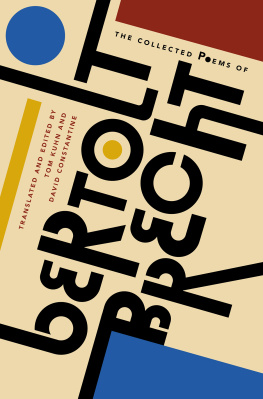
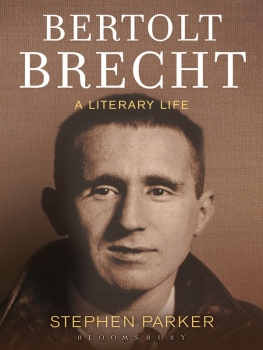
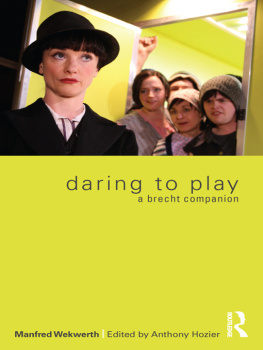
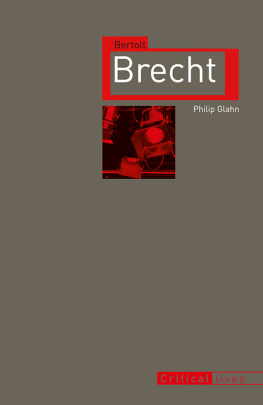
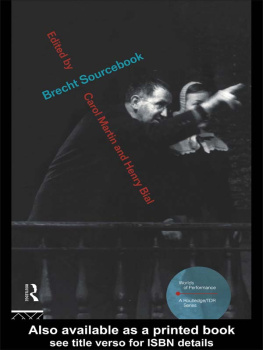
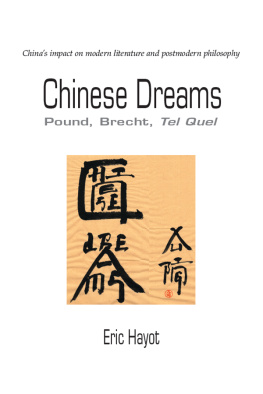
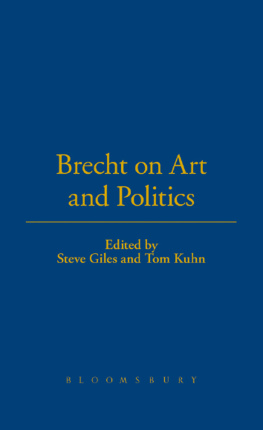



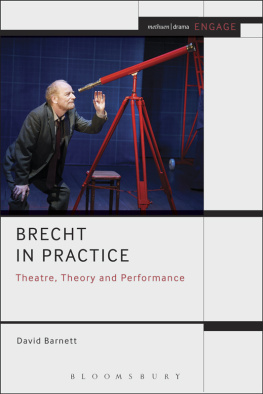

 The Collected Poems of BERTOLT
The Collected Poems of BERTOLT TRANSLATED AND EDITED BY TOM KUHN AND DAVID CONSTANTINE WITH THE ASSISTANCE OF CHARLOTTE RYLAND
TRANSLATED AND EDITED BY TOM KUHN AND DAVID CONSTANTINE WITH THE ASSISTANCE OF CHARLOTTE RYLAND  LIVERIGHT PUBLISHING CORPORATION A Division of W. W. Norton & Company Independent Publishers Since 1923 New York | London Adjusting type size may change line breaks. Landscape mode may help to preserve line breaks.
LIVERIGHT PUBLISHING CORPORATION A Division of W. W. Norton & Company Independent Publishers Since 1923 New York | London Adjusting type size may change line breaks. Landscape mode may help to preserve line breaks.